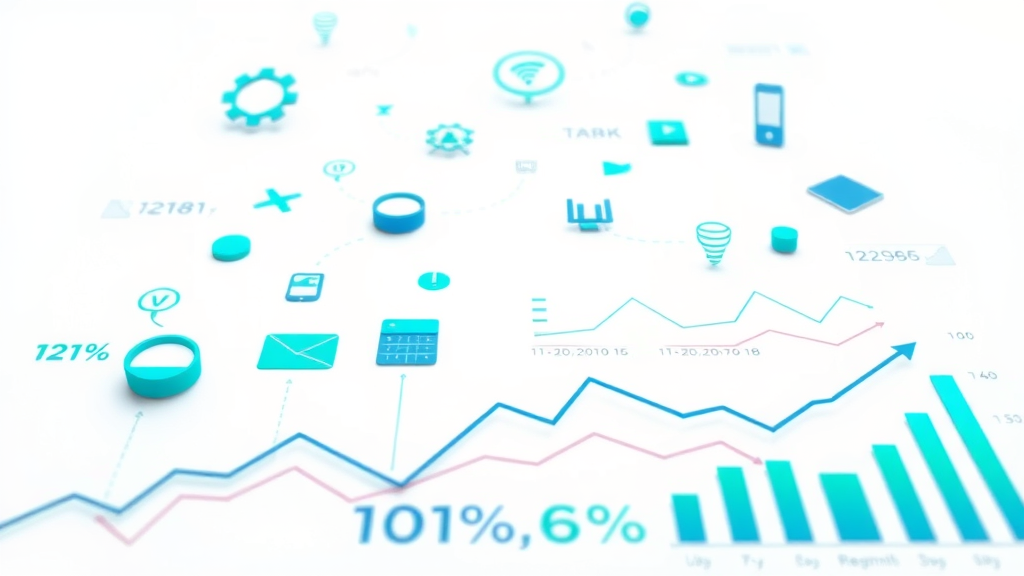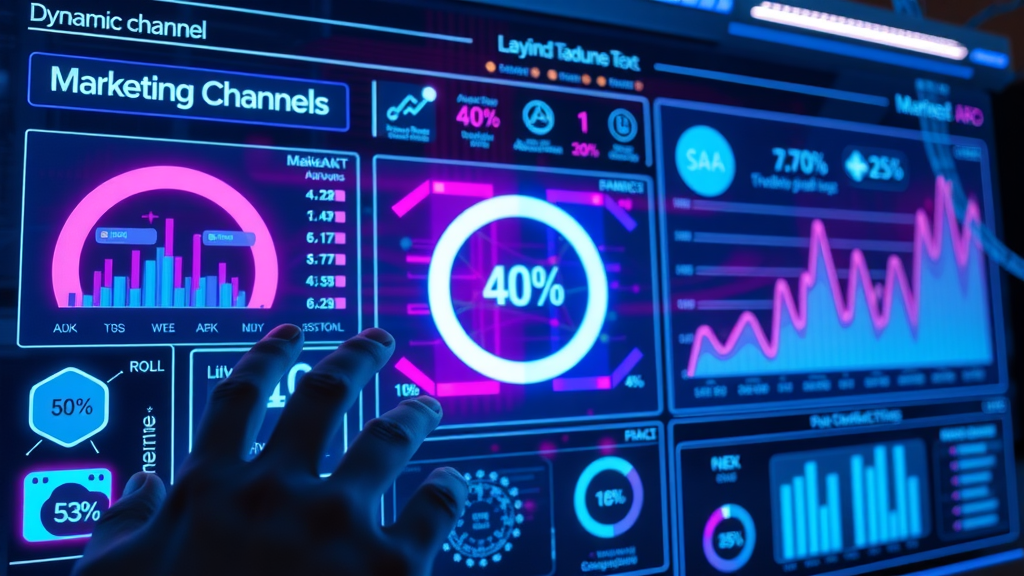Did you know? Over 70% of businesses have accelerated their digital marketing efforts in the last two years, transforming how they reach customers, boost sales, and outpace competitors. With consumers spending more time online than ever before, the digital landscape offers unprecedented opportunities. But is digital marketing truly the breakthrough your business needs? This comprehensive guide reveals what digital marketing really means for your success—and how to leverage it for maximum impact.

Digital Marketing: An Unconventional Force—The Facts Revealed
"Over 70% of businesses have accelerated their digital marketing efforts in the last two years."
The digital marketing landscape is evolving at unprecedented speed. Once considered a supplementary tactic, digital marketing has become the driving force behind brand awareness, customer engagement, and measurable growth. Businesses that recognize and adapt to these changes are reaping the rewards—those that don’t risk falling behind. From global corporations to small local startups, digital marketing is leveling the playing field, making it possible for businesses to connect with their target audience like never before.
Central to this transformation is the ability to use multiple digital channels: search engine marketing, email marketing, and social media platform engagement—all strategically targeted for maximum effect. Real-time data analytics and campaign tracking allow digital marketers to quickly adjust their tactics, unlike traditional marketing’s slower, less measurable approach. If you’re looking to improve your marketing work, expand your reach, and personalize interactions, understanding digital marketing is no longer optional—it's essential.
What You'll Learn About Digital Marketing
- The definition and core components of digital marketing
- How digital marketing compares to traditional methods
- Step-by-step breakdown of effective digital marketing strategies
- Practical guidance for launching your own digital marketing campaign
- Expert tips to optimize your digital marketing efforts
- Answers to the most frequently asked questions about digital marketing

Defining Digital Marketing: Modern Strategies for Today's Business
What is Digital Marketing? Essential Concepts for Marketers
Digital marketing encompasses all marketing efforts using electronic devices or the internet to engage with current and potential customers. Unlike traditional marketing, which relies heavily on mediums such as print, radio, or television, digital marketing leverages digital channels like search engines, social media, email, and websites to deliver targeted messages. These channels enable businesses to communicate directly with their target audience, gather valuable insights, and tailor their marketing campaigns based on real-time feedback.
Core components of a digital marketing strategy include search engine optimization (SEO), email marketing, content marketing, social media marketing, and more. By utilizing these techniques, businesses can increase brand awareness, reach new customers, and drive traffic to their products and services.
How Does Digital Marketing Differ from Traditional Marketing?
The difference between digital marketing and traditional marketing lies in their reach, adaptability, and effectiveness. Traditional marketing campaigns depend on print, billboards, and broadcast media, which often have limited targeting and take longer to adjust. In contrast, digital marketing provides global reach, interactive communication, and real-time analytics. With tools like Google Ads, businesses can reach hundreds of thousands of potential customers instantly and adjust their approach to maximize results.
Moreover, digital marketing channels foster two-way communication, allowing for immediate customer feedback and engagement. This enables digital marketers to make data-driven decisions, maximizing ROI and building strong, lasting relationships with their audience.
The Digital Marketing Landscape: Channels, Platforms, and Strategies
Main Digital Marketing Channels Every Business Should Know
- Search engine optimization (SEO)
- Search engine marketing (SEM)
- Social media marketing
- Content marketing
- Email marketing
- Affiliate marketing
- Display advertising

Understanding digital marketing channels is crucial for success. SEO and SEM place your brand in front of customers through search engines, driving qualified traffic to your site. Social media marketing on platforms like Facebook, Instagram, or LinkedIn lets you connect directly with your target audience and build brand loyalty. Content marketing establishes authority, while email marketing delivers personalized communication that keeps your audience engaged. Affiliate marketing and display advertising extend your reach and generate measurable results. Selecting the right digital channel for your goals is fundamental for an effective digital marketing strategy.
For businesses aiming to accelerate their brand visibility and drive immediate results, leveraging advanced display ad targeting can be a game-changer. Discover actionable tactics in this guide to mastering display ad targeting for instant campaign wins and see how precise audience segmentation can amplify your digital marketing outcomes.
Social Media in Digital Marketing: Choosing the Right Platform
Social media platforms play a pivotal role in digital marketing work. To maximize return, businesses must prioritize platforms where their target audience spends the most time. For instance, B2B companies often focus on LinkedIn for its professional environment, while B2C brands find success on Instagram, Facebook, and TikTok. Analyzing your audience demographics and behaviors helps determine the best social media platform for engagement, lead generation, and brand awareness initiatives.
Each media platform offers unique advantages—Facebook boasts extensive reach and targeting options, while Instagram excels in visual storytelling. LinkedIn is the go-to for business partnerships, and TikTok offers virality for brands with creative, short-form content. Digital marketers must tailor their content and campaigns to fit each platform to achieve maximum effectiveness.
Best Practices for Digital Marketing Strategy Development
A strong digital marketing strategy hinges on research, planning, and agility. Begin by defining clear objectives and identifying your target audience. Utilize analytics tools to monitor performance across every marketing channel. Successful strategies involve A/B testing, analyzing campaign data, and optimizing your efforts regularly to align with audience interests and changing trends. Collaboration among marketing teams, from content creation to social media posting, ensures campaigns are consistent and results-driven.
Additionally, integrating content marketing, email marketing, and search engine optimization elevates your digital marketing campaigns. Digital marketers should always stay informed on the latest algorithm changes or platform updates to maintain a competitive edge. Remember, digital marketing is not a set-and-forget process; continuous improvement is key.
Digital Marketing vs. Traditional Marketing: Comparison Table
| Aspect | Digital Marketing | Traditional Marketing |
|---|---|---|
| Cost | Generally lower—pay-per-click, CPM | Usually higher—TV, print, radio |
| Reach | Global, highly targeted | Geographically limited |
| Measurability | Real-time analytics | Challenging to measure |
| Interactivity | High—comments, shares, likes | Low—one-way communication |
| Adjustability | Easily updated & dynamic | Difficult or slow to change |

What Does a Digital Marketer Do Exactly?
Answer: A Look at a Digital Marketer's Core Tasks and Skills

A digital marketer wears many hats. At the heart of the role is developing and executing digital marketing campaigns designed to increase brand awareness, generate leads, and drive sales. Common tasks include researching keywords for SEO and SEM, managing social media platforms, crafting content for websites or blogs, creating email marketing sequences, and analyzing campaign performance through sophisticated analytics dashboards. Digital marketers also work closely with designers, developers, and copywriters, ensuring consistent brand messaging across all digital channels.
Essential skills include data analysis, content creation, SEO strategy, social media management, and campaign optimization. The most effective digital marketers are adaptable, creative, and data-driven, continually learning new platforms and trends to keep their marketing strategies fresh and impactful.
The 7 Types of Digital Marketing Explained
What Are the 7 Types of Digital Marketing?
- Search Engine Optimization (SEO)
- Search Engine Marketing (SEM)
- Content Marketing
- Social Media Marketing
- Email Marketing
- Affiliate Marketing
- Mobile Marketing
These seven types of digital marketing form the foundation of powerful marketing strategies. SEO increases visibility on search engines, while SEM drives instant traffic through paid ads. Content marketing builds trust and authority, and social media marketing expands brand reach and community engagement. Email marketing offers direct, personalized communication, while affiliate marketing leverages partnerships for wider exposure. Mobile marketing focuses on reaching users via smartphones and tablets, harnessing the power of push notifications, app-based campaigns, and SMS.
Every digital marketer should understand each type’s strengths and how they complement each other in an integrated digital marketing strategy. Combining multiple marketing channels increases the odds of reaching your target audience and achieving your business goals.
How to Start Your Digital Marketing Journey
How Do I Start My Digital Marketing?
- Define your target audience and objectives
- Select the most relevant digital channels
- Develop a content plan and calendar
- Launch campaigns and measure performance
- Continuously optimize strategies

To launch your digital marketing journey, start by pinpointing your target audience—demographics, interests, and pain points. Next, choose digital channels that align with your audience’s online behaviors. Develop a detailed content calendar outlining topics, formats, and posting schedules across each platform. Upon launching your campaigns, use analytics to measure what’s working and where to pivot. Constant optimization, from tweaking email subject lines to adjusting paid ad targeting, ensures sustained success.
Remember, successful digital marketing isn’t about doing everything at once. Prioritize a few digital channels where your audience is most active and scale as you gain insights and see results from your marketing efforts.
What Does a Digital Marketer Make?
Digital Marketing Salaries: What to Expect in the Industry

The earning potential of a digital marketer varies based on experience, specialization, and company size. Entry-level digital marketers may start around $40,000 to $50,000 annually, while experienced specialists in SEO, SEM, or digital marketing strategy may command salaries of $75,000–$120,000 or more. Top-performing digital marketing managers and directors at larger organizations or agencies can exceed $150,000, especially with advanced skills in data analytics, content marketing, and campaign management.
Besides competitive pay, digital marketers benefit from flexible work options, rapid career advancement, and the chance to shape the future of how businesses connect with their customers in a digital-first world.
Crafting a Winning Digital Marketing Strategy
Step-by-Step Guide to a Digital Marketing Strategy
- Identify business goals
- Conduct market and audience research
- Set KPIs and budget
- Create and distribute content
- Utilize digital channels strategically
- Analyze and adjust campaigns
Building a results-driven digital marketing strategy starts with establishing clear business goals—what do you want your marketing efforts to achieve? Research your market, your competitors, and your audience’s needs. Next, decide on key performance indicators (KPIs) and allocate a budget for ad spend, tools, and resources. Develop compelling content that aligns with your brand and attracts your target audience. Deploy campaigns across chosen digital channels, using analytics to monitor progress and quickly adjust tactics. This iterative approach ensures campaigns stay relevant and effective.
Flexibility is crucial in digital marketing; trends, platforms, and audience interests shift rapidly. Digital marketers who continuously evaluate and refine their strategies see the greatest returns.
Digital Marketing Tools and Resources
- Google Analytics
- Hootsuite
- Mailchimp
- Ahrefs
- Canva

Every successful campaign relies on the right toolkit. Google Analytics tracks website performance and user behaviors; Hootsuite simplifies social media scheduling and monitoring; Mailchimp streamlines email marketing campaigns; Ahrefs assists with SEO, keyword research, and competitor analysis; Canva offers design tools for creating eye-catching visuals. Investing in these digital marketing tools helps ensure campaigns run efficiently, data is measured accurately, and creative assets are on-brand and compelling.
"Success with digital marketing comes from experimentation, adaptability, and knowing your audience."
The Role of Content Marketing, Email Marketing, and SEO in Digital Marketing
Content Marketing's Impact on Brand Growth
Content marketing is the backbone of modern brand building. By providing useful, relevant, and high-quality content—whether through blogs, videos, infographics, or guides—you position your brand as a trusted authority. Well-crafted content draws in your target audience, nurtures leads, and keeps customers coming back for more. Content marketing also boosts SEO, helping your business climb search engine rankings and capture valuable organic traffic.
Today’s marketplace demands authenticity and transparency. Content marketing lets you tell your story, address customer pain points, and outshine competitors by delivering consistent value. When paired with smart distribution on digital channels and social media, the impact multiplies.
Email Marketing: Direct Reach in Digital Marketing

Email marketing offers businesses a direct line to their audience—right in their inbox. By segmenting lists according to user behavior, interests, or demographics, marketers can send personalized, relevant messages that increase open rates and conversions. Email marketing is also highly measurable, providing data on what works best for your target audience.
Combining email marketing with automation tools, businesses can nurture leads, announce new products and services, and drive repeat business. Email remains one of the most cost-effective digital marketing channels, delivering high ROI for both large and small companies.
SEO and Search Engine Optimization: The Backbone of Visibility

Search engine optimization (SEO) ensures your website is discoverable by search engines and, ultimately, your target audience. Effective SEO includes optimizing on-page content with relevant keywords; improving site speed and mobile usability; building backlinks; and publishing valuable, shareable content. The goal is to increase your organic rankings, which drives consistent, qualified traffic to your site.
As search engines continually update their ranking algorithms, staying ahead requires up-to-date knowledge, regular audits, and flexible strategies. Investing in SEO is a long-term tactic that pays dividends by keeping your products and services visible to potential customers at the very moment they’re searching.
Expert Tips for Effective Digital Marketing
- Leverage multiple marketing channels for broader reach
- Measure campaign success frequently
- Personalize content to your target audience
- Stay updated with digital marketi trends
- Focus on strong digital marketing strategy frameworks
To maximize the potential of digital marketing, use a multi-channel approach, integrating social media, SEO, content marketing, and email marketing. Continually analyze your results and look for opportunities to refine your strategy. Personalization is key—understand your target audience and tailor messages, offers, and creatives to match their interests. Stay informed on digital marketi trends and embrace new platforms or tools when applicable. Lastly, lean on proven frameworks to maintain consistency and direction across all campaigns.
Watch how real small businesses achieved remarkable growth through strategic digital marketing campaigns—examples and key takeaways included.
Explore actionable steps for creating, launching, and optimizing your first digital marketing campaign. This video walks you through audience targeting, campaign setup, monitoring, and key performance metrics for success.
Key Takeaways: Why Digital Marketing Works for Modern Businesses
- Digital marketing delivers measurable, scalable results
- Adaptation and continuous learning are key to success
- Multi-channel approaches yield the best outcomes
Digital marketing offers agility, accountability, and audience targeting that traditional marketing can't match. By embracing a digital-first mindset, businesses of all sizes can grow faster and smarter.
Frequently Asked Questions on Digital Marketing
What is a digital marketing channel?
A digital marketing channel is any online platform or method businesses use to communicate and engage with their target audience. Common digital channels include social media, search engines, email, content networks, and paid advertising platforms. Effective digital marketing strategies use a mix of channels to reach more potential customers, build brand awareness, and drive sales.
Which social media platform should businesses prioritize for their marketing strategy?
The best social media platform depends on your target audience and business goals. For B2B businesses, LinkedIn often yields great results due to its professional network. For B2C brands, Instagram, Facebook, and TikTok are popular for visually driven campaigns and broad reach. Research where your audience spends time and customize your marketing efforts for that platform to maximize your impact.
How do marketing efforts differ across digital marketing strategies?
Marketing efforts vary based on the chosen strategy and channel. SEO and content marketing focus on organic growth and long-term authority, while SEM and display advertising provide quick, measurable results. Social media marketing is ideal for engagement and community building, while email marketing excels at direct, personalized offers. The best approach combines multiple strategies for a comprehensive digital marketing campaign.
Conclusion: Is Digital Marketing the Breakthrough Your Business Needs?
Digital Marketing: Final Thoughts and Recommendations
The digital age has redefined marketing. By embracing digital marketing, your business can connect with new customers, adapt faster, and grow smarter than ever. Start exploring digital channels and strategies today for a lasting competitive edge.
For More on Social Media and Digital Marketing Strategy
Read The Ultimate Guide to Social Media Marketing: Strategy, Platforms, Channels, and Tips to Win, and How to Build a Winning Plan.
Need Help? Call Digital Media Marketing at 1-586-997-0001
If you’re ready to take your digital marketing to the next level, consider exploring broader strategies that can rapidly elevate your brand’s presence. Our resource on unlocking digital display marketing to boost your brand fast dives into high-impact approaches for building awareness and driving growth. Whether you’re just starting out or looking to refine your existing campaigns, these advanced insights can help you stay ahead of the competition and achieve measurable results. Continue your learning journey and discover how a holistic digital marketing approach can transform your business outcomes.
 Add Row
Add Row  Add
Add 




Write A Comment